Barriers and Strategies for Mental Health Treatment
VerifiedAdded on 2023/06/13
|11
|2810
|495
AI Summary
This evidence-based nursing research explores the barriers and strategies for mental health treatment. It discusses how nurses balance respect for patients with mental disorders and the right to involvement in decision making about their health. The article also covers the subject of mental health disorder, its treatment, and the barriers that hinder the implementation of mental disorder treatment. Strategies to overcome these barriers are also discussed.
Contribute Materials
Your contribution can guide someone’s learning journey. Share your
documents today.
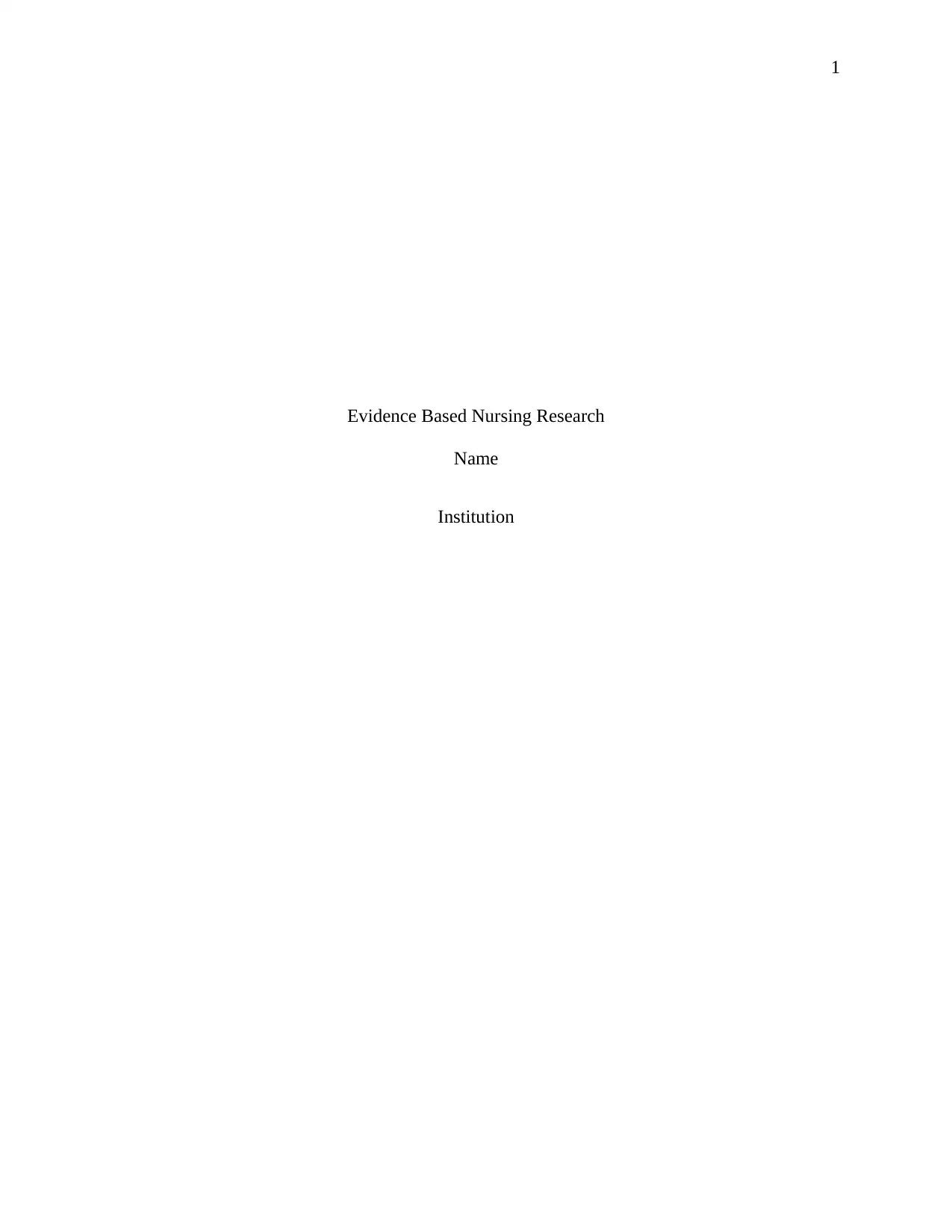
1
Evidence Based Nursing Research
Name
Institution
Evidence Based Nursing Research
Name
Institution
Secure Best Marks with AI Grader
Need help grading? Try our AI Grader for instant feedback on your assignments.
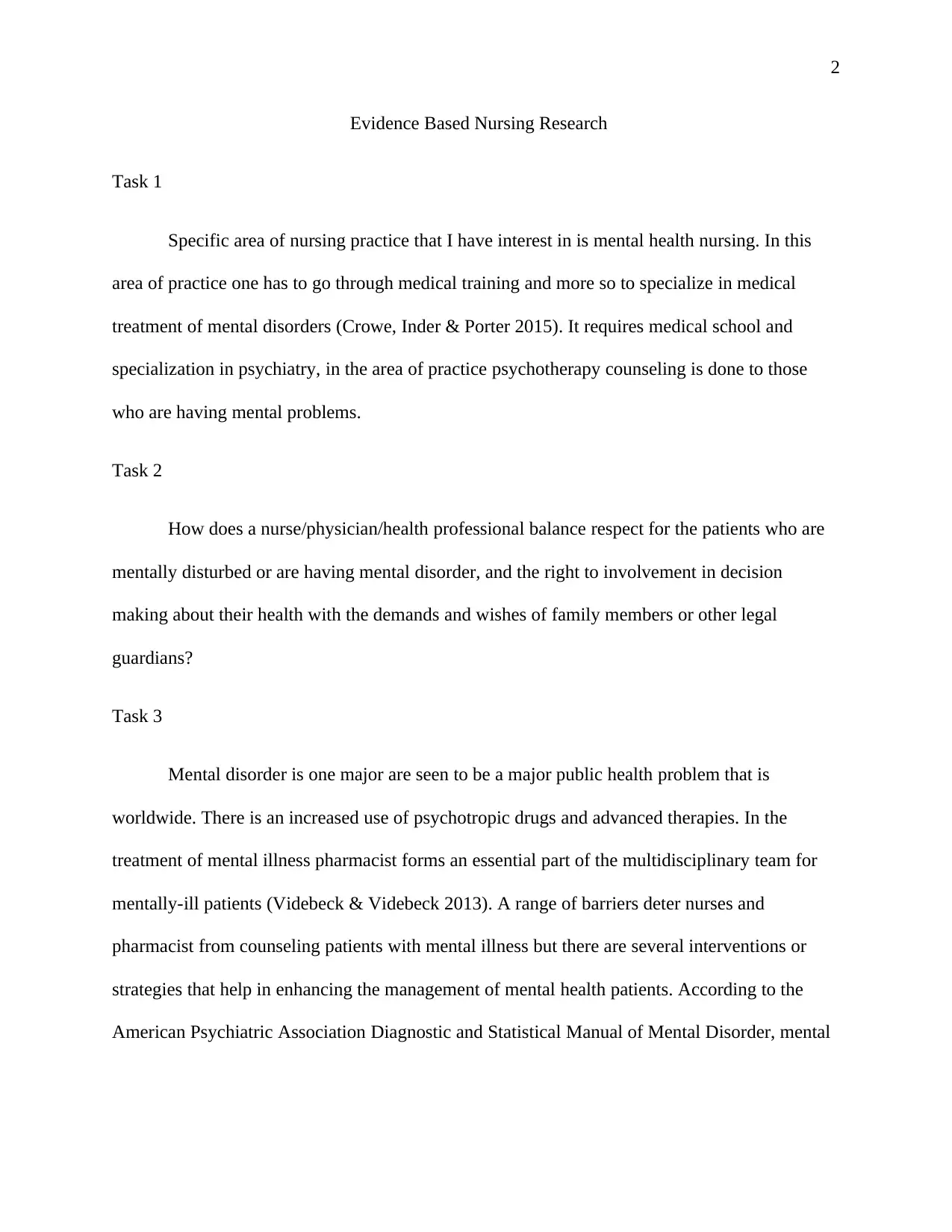
2
Evidence Based Nursing Research
Task 1
Specific area of nursing practice that I have interest in is mental health nursing. In this
area of practice one has to go through medical training and more so to specialize in medical
treatment of mental disorders (Crowe, Inder & Porter 2015). It requires medical school and
specialization in psychiatry, in the area of practice psychotherapy counseling is done to those
who are having mental problems.
Task 2
How does a nurse/physician/health professional balance respect for the patients who are
mentally disturbed or are having mental disorder, and the right to involvement in decision
making about their health with the demands and wishes of family members or other legal
guardians?
Task 3
Mental disorder is one major are seen to be a major public health problem that is
worldwide. There is an increased use of psychotropic drugs and advanced therapies. In the
treatment of mental illness pharmacist forms an essential part of the multidisciplinary team for
mentally-ill patients (Videbeck & Videbeck 2013). A range of barriers deter nurses and
pharmacist from counseling patients with mental illness but there are several interventions or
strategies that help in enhancing the management of mental health patients. According to the
American Psychiatric Association Diagnostic and Statistical Manual of Mental Disorder, mental
Evidence Based Nursing Research
Task 1
Specific area of nursing practice that I have interest in is mental health nursing. In this
area of practice one has to go through medical training and more so to specialize in medical
treatment of mental disorders (Crowe, Inder & Porter 2015). It requires medical school and
specialization in psychiatry, in the area of practice psychotherapy counseling is done to those
who are having mental problems.
Task 2
How does a nurse/physician/health professional balance respect for the patients who are
mentally disturbed or are having mental disorder, and the right to involvement in decision
making about their health with the demands and wishes of family members or other legal
guardians?
Task 3
Mental disorder is one major are seen to be a major public health problem that is
worldwide. There is an increased use of psychotropic drugs and advanced therapies. In the
treatment of mental illness pharmacist forms an essential part of the multidisciplinary team for
mentally-ill patients (Videbeck & Videbeck 2013). A range of barriers deter nurses and
pharmacist from counseling patients with mental illness but there are several interventions or
strategies that help in enhancing the management of mental health patients. According to the
American Psychiatric Association Diagnostic and Statistical Manual of Mental Disorder, mental
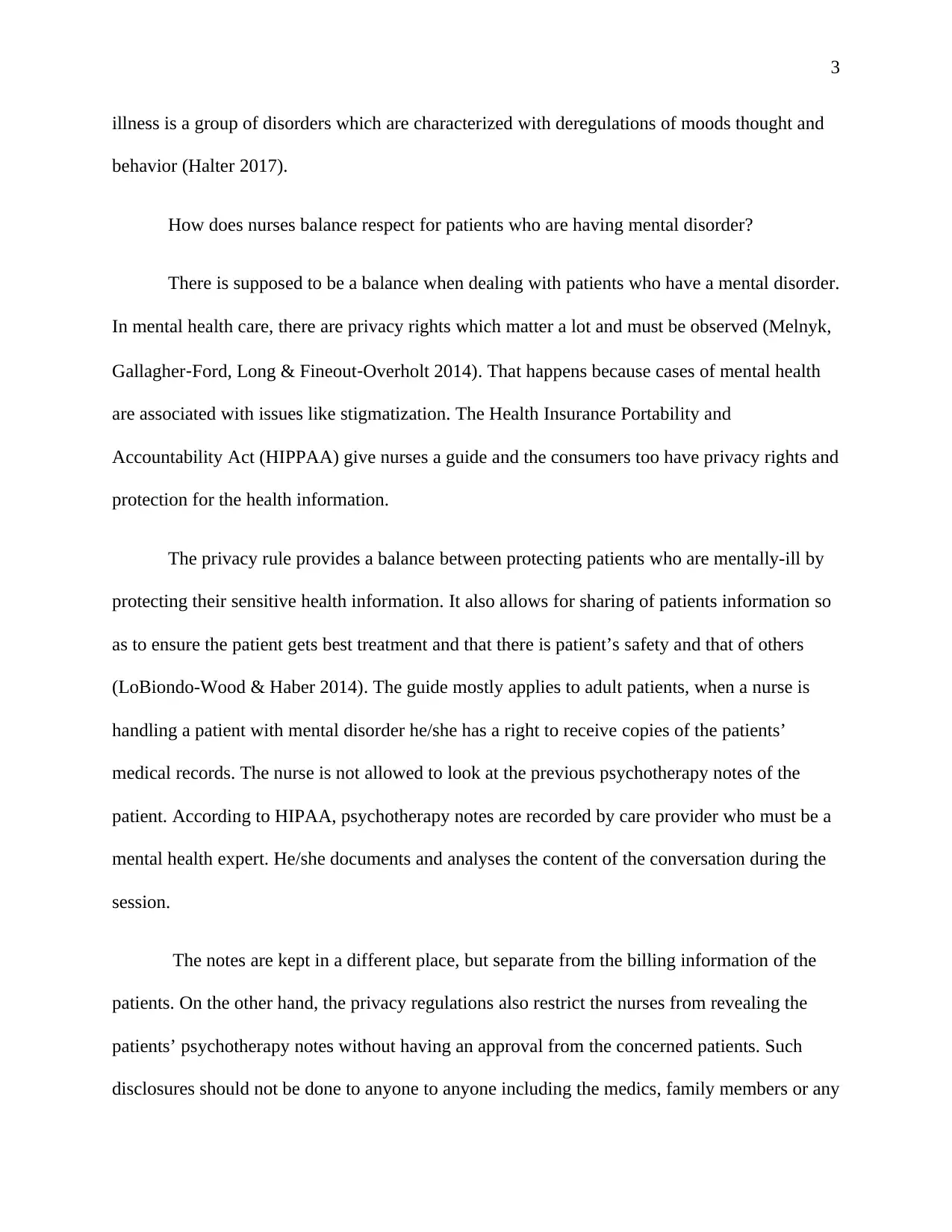
3
illness is a group of disorders which are characterized with deregulations of moods thought and
behavior (Halter 2017).
How does nurses balance respect for patients who are having mental disorder?
There is supposed to be a balance when dealing with patients who have a mental disorder.
In mental health care, there are privacy rights which matter a lot and must be observed (Melnyk,
Gallagher‐Ford, Long & Fineout‐Overholt 2014). That happens because cases of mental health
are associated with issues like stigmatization. The Health Insurance Portability and
Accountability Act (HIPPAA) give nurses a guide and the consumers too have privacy rights and
protection for the health information.
The privacy rule provides a balance between protecting patients who are mentally-ill by
protecting their sensitive health information. It also allows for sharing of patients information so
as to ensure the patient gets best treatment and that there is patient’s safety and that of others
(LoBiondo-Wood & Haber 2014). The guide mostly applies to adult patients, when a nurse is
handling a patient with mental disorder he/she has a right to receive copies of the patients’
medical records. The nurse is not allowed to look at the previous psychotherapy notes of the
patient. According to HIPAA, psychotherapy notes are recorded by care provider who must be a
mental health expert. He/she documents and analyses the content of the conversation during the
session.
The notes are kept in a different place, but separate from the billing information of the
patients. On the other hand, the privacy regulations also restrict the nurses from revealing the
patients’ psychotherapy notes without having an approval from the concerned patients. Such
disclosures should not be done to anyone to anyone including the medics, family members or any
illness is a group of disorders which are characterized with deregulations of moods thought and
behavior (Halter 2017).
How does nurses balance respect for patients who are having mental disorder?
There is supposed to be a balance when dealing with patients who have a mental disorder.
In mental health care, there are privacy rights which matter a lot and must be observed (Melnyk,
Gallagher‐Ford, Long & Fineout‐Overholt 2014). That happens because cases of mental health
are associated with issues like stigmatization. The Health Insurance Portability and
Accountability Act (HIPPAA) give nurses a guide and the consumers too have privacy rights and
protection for the health information.
The privacy rule provides a balance between protecting patients who are mentally-ill by
protecting their sensitive health information. It also allows for sharing of patients information so
as to ensure the patient gets best treatment and that there is patient’s safety and that of others
(LoBiondo-Wood & Haber 2014). The guide mostly applies to adult patients, when a nurse is
handling a patient with mental disorder he/she has a right to receive copies of the patients’
medical records. The nurse is not allowed to look at the previous psychotherapy notes of the
patient. According to HIPAA, psychotherapy notes are recorded by care provider who must be a
mental health expert. He/she documents and analyses the content of the conversation during the
session.
The notes are kept in a different place, but separate from the billing information of the
patients. On the other hand, the privacy regulations also restrict the nurses from revealing the
patients’ psychotherapy notes without having an approval from the concerned patients. Such
disclosures should not be done to anyone to anyone including the medics, family members or any
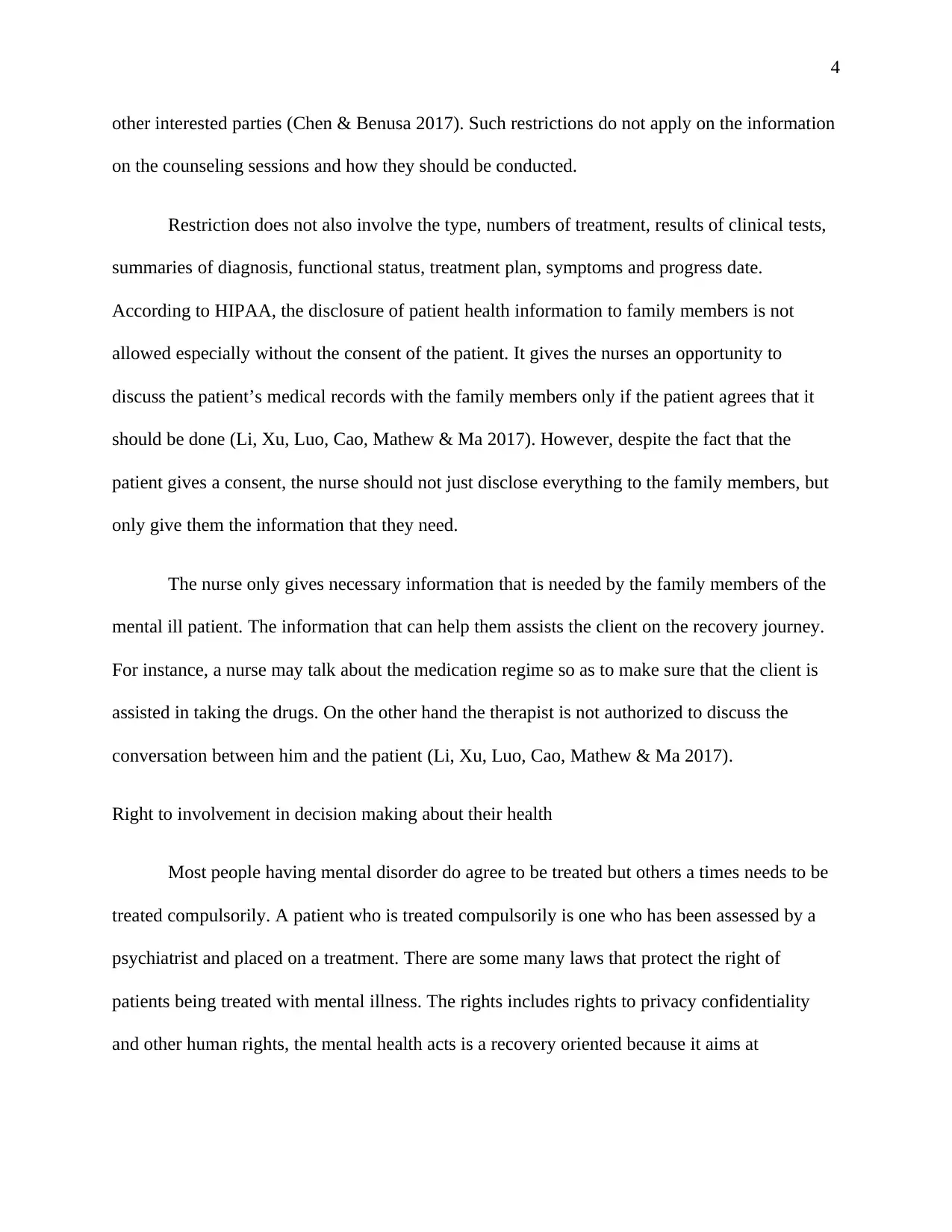
4
other interested parties (Chen & Benusa 2017). Such restrictions do not apply on the information
on the counseling sessions and how they should be conducted.
Restriction does not also involve the type, numbers of treatment, results of clinical tests,
summaries of diagnosis, functional status, treatment plan, symptoms and progress date.
According to HIPAA, the disclosure of patient health information to family members is not
allowed especially without the consent of the patient. It gives the nurses an opportunity to
discuss the patient’s medical records with the family members only if the patient agrees that it
should be done (Li, Xu, Luo, Cao, Mathew & Ma 2017). However, despite the fact that the
patient gives a consent, the nurse should not just disclose everything to the family members, but
only give them the information that they need.
The nurse only gives necessary information that is needed by the family members of the
mental ill patient. The information that can help them assists the client on the recovery journey.
For instance, a nurse may talk about the medication regime so as to make sure that the client is
assisted in taking the drugs. On the other hand the therapist is not authorized to discuss the
conversation between him and the patient (Li, Xu, Luo, Cao, Mathew & Ma 2017).
Right to involvement in decision making about their health
Most people having mental disorder do agree to be treated but others a times needs to be
treated compulsorily. A patient who is treated compulsorily is one who has been assessed by a
psychiatrist and placed on a treatment. There are some many laws that protect the right of
patients being treated with mental illness. The rights includes rights to privacy confidentiality
and other human rights, the mental health acts is a recovery oriented because it aims at
other interested parties (Chen & Benusa 2017). Such restrictions do not apply on the information
on the counseling sessions and how they should be conducted.
Restriction does not also involve the type, numbers of treatment, results of clinical tests,
summaries of diagnosis, functional status, treatment plan, symptoms and progress date.
According to HIPAA, the disclosure of patient health information to family members is not
allowed especially without the consent of the patient. It gives the nurses an opportunity to
discuss the patient’s medical records with the family members only if the patient agrees that it
should be done (Li, Xu, Luo, Cao, Mathew & Ma 2017). However, despite the fact that the
patient gives a consent, the nurse should not just disclose everything to the family members, but
only give them the information that they need.
The nurse only gives necessary information that is needed by the family members of the
mental ill patient. The information that can help them assists the client on the recovery journey.
For instance, a nurse may talk about the medication regime so as to make sure that the client is
assisted in taking the drugs. On the other hand the therapist is not authorized to discuss the
conversation between him and the patient (Li, Xu, Luo, Cao, Mathew & Ma 2017).
Right to involvement in decision making about their health
Most people having mental disorder do agree to be treated but others a times needs to be
treated compulsorily. A patient who is treated compulsorily is one who has been assessed by a
psychiatrist and placed on a treatment. There are some many laws that protect the right of
patients being treated with mental illness. The rights includes rights to privacy confidentiality
and other human rights, the mental health acts is a recovery oriented because it aims at
Secure Best Marks with AI Grader
Need help grading? Try our AI Grader for instant feedback on your assignments.
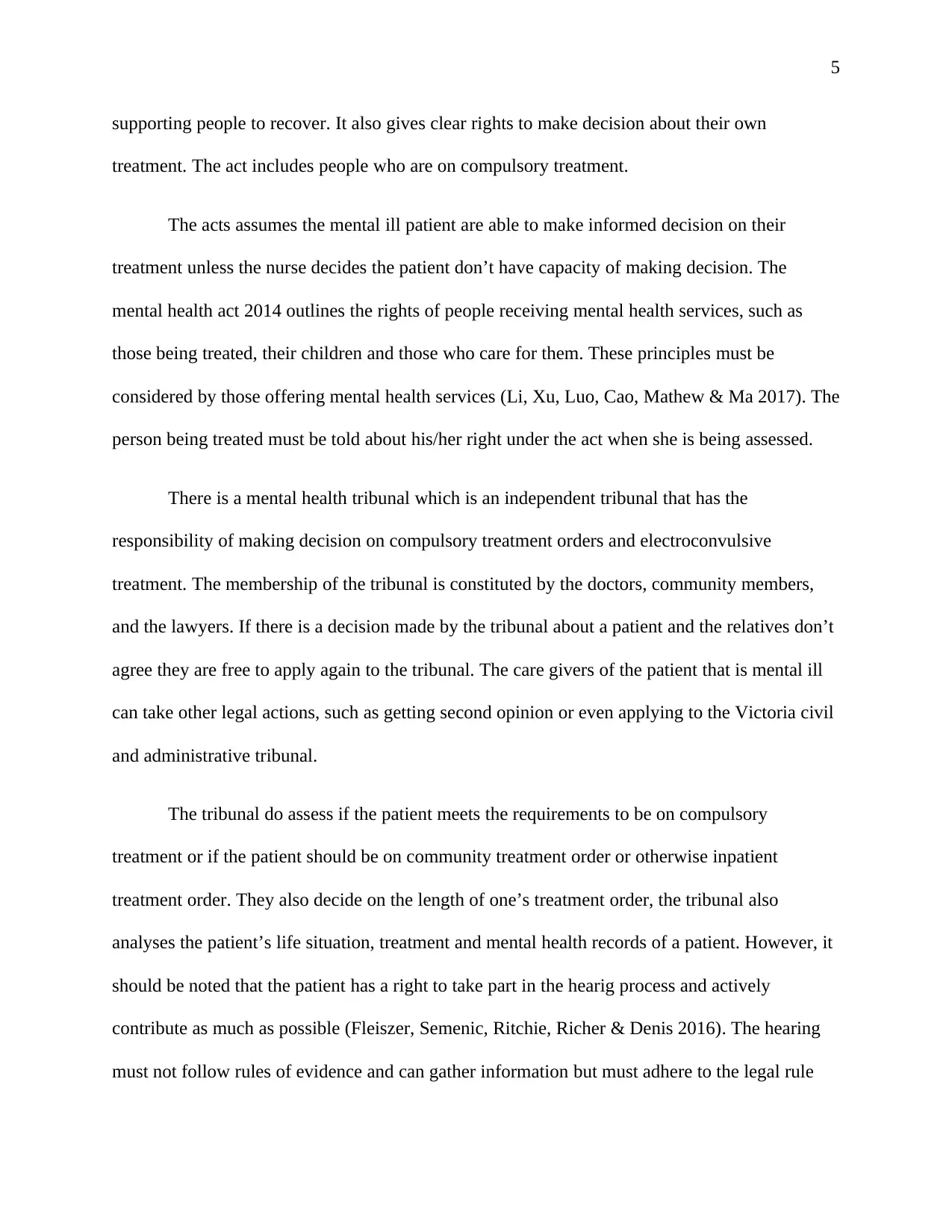
5
supporting people to recover. It also gives clear rights to make decision about their own
treatment. The act includes people who are on compulsory treatment.
The acts assumes the mental ill patient are able to make informed decision on their
treatment unless the nurse decides the patient don’t have capacity of making decision. The
mental health act 2014 outlines the rights of people receiving mental health services, such as
those being treated, their children and those who care for them. These principles must be
considered by those offering mental health services (Li, Xu, Luo, Cao, Mathew & Ma 2017). The
person being treated must be told about his/her right under the act when she is being assessed.
There is a mental health tribunal which is an independent tribunal that has the
responsibility of making decision on compulsory treatment orders and electroconvulsive
treatment. The membership of the tribunal is constituted by the doctors, community members,
and the lawyers. If there is a decision made by the tribunal about a patient and the relatives don’t
agree they are free to apply again to the tribunal. The care givers of the patient that is mental ill
can take other legal actions, such as getting second opinion or even applying to the Victoria civil
and administrative tribunal.
The tribunal do assess if the patient meets the requirements to be on compulsory
treatment or if the patient should be on community treatment order or otherwise inpatient
treatment order. They also decide on the length of one’s treatment order, the tribunal also
analyses the patient’s life situation, treatment and mental health records of a patient. However, it
should be noted that the patient has a right to take part in the hearig process and actively
contribute as much as possible (Fleiszer, Semenic, Ritchie, Richer & Denis 2016). The hearing
must not follow rules of evidence and can gather information but must adhere to the legal rule
supporting people to recover. It also gives clear rights to make decision about their own
treatment. The act includes people who are on compulsory treatment.
The acts assumes the mental ill patient are able to make informed decision on their
treatment unless the nurse decides the patient don’t have capacity of making decision. The
mental health act 2014 outlines the rights of people receiving mental health services, such as
those being treated, their children and those who care for them. These principles must be
considered by those offering mental health services (Li, Xu, Luo, Cao, Mathew & Ma 2017). The
person being treated must be told about his/her right under the act when she is being assessed.
There is a mental health tribunal which is an independent tribunal that has the
responsibility of making decision on compulsory treatment orders and electroconvulsive
treatment. The membership of the tribunal is constituted by the doctors, community members,
and the lawyers. If there is a decision made by the tribunal about a patient and the relatives don’t
agree they are free to apply again to the tribunal. The care givers of the patient that is mental ill
can take other legal actions, such as getting second opinion or even applying to the Victoria civil
and administrative tribunal.
The tribunal do assess if the patient meets the requirements to be on compulsory
treatment or if the patient should be on community treatment order or otherwise inpatient
treatment order. They also decide on the length of one’s treatment order, the tribunal also
analyses the patient’s life situation, treatment and mental health records of a patient. However, it
should be noted that the patient has a right to take part in the hearig process and actively
contribute as much as possible (Fleiszer, Semenic, Ritchie, Richer & Denis 2016). The hearing
must not follow rules of evidence and can gather information but must adhere to the legal rule
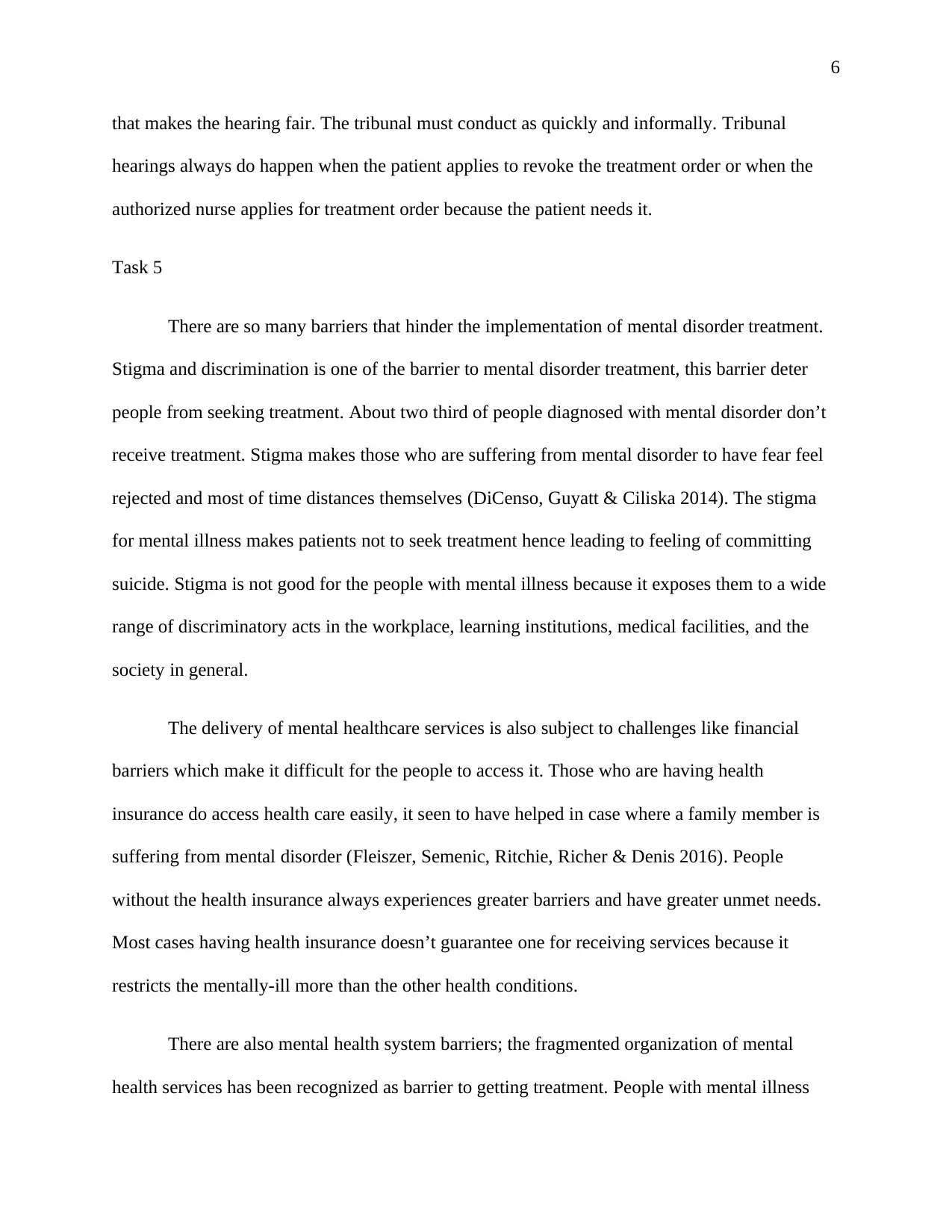
6
that makes the hearing fair. The tribunal must conduct as quickly and informally. Tribunal
hearings always do happen when the patient applies to revoke the treatment order or when the
authorized nurse applies for treatment order because the patient needs it.
Task 5
There are so many barriers that hinder the implementation of mental disorder treatment.
Stigma and discrimination is one of the barrier to mental disorder treatment, this barrier deter
people from seeking treatment. About two third of people diagnosed with mental disorder don’t
receive treatment. Stigma makes those who are suffering from mental disorder to have fear feel
rejected and most of time distances themselves (DiCenso, Guyatt & Ciliska 2014). The stigma
for mental illness makes patients not to seek treatment hence leading to feeling of committing
suicide. Stigma is not good for the people with mental illness because it exposes them to a wide
range of discriminatory acts in the workplace, learning institutions, medical facilities, and the
society in general.
The delivery of mental healthcare services is also subject to challenges like financial
barriers which make it difficult for the people to access it. Those who are having health
insurance do access health care easily, it seen to have helped in case where a family member is
suffering from mental disorder (Fleiszer, Semenic, Ritchie, Richer & Denis 2016). People
without the health insurance always experiences greater barriers and have greater unmet needs.
Most cases having health insurance doesn’t guarantee one for receiving services because it
restricts the mentally-ill more than the other health conditions.
There are also mental health system barriers; the fragmented organization of mental
health services has been recognized as barrier to getting treatment. People with mental illness
that makes the hearing fair. The tribunal must conduct as quickly and informally. Tribunal
hearings always do happen when the patient applies to revoke the treatment order or when the
authorized nurse applies for treatment order because the patient needs it.
Task 5
There are so many barriers that hinder the implementation of mental disorder treatment.
Stigma and discrimination is one of the barrier to mental disorder treatment, this barrier deter
people from seeking treatment. About two third of people diagnosed with mental disorder don’t
receive treatment. Stigma makes those who are suffering from mental disorder to have fear feel
rejected and most of time distances themselves (DiCenso, Guyatt & Ciliska 2014). The stigma
for mental illness makes patients not to seek treatment hence leading to feeling of committing
suicide. Stigma is not good for the people with mental illness because it exposes them to a wide
range of discriminatory acts in the workplace, learning institutions, medical facilities, and the
society in general.
The delivery of mental healthcare services is also subject to challenges like financial
barriers which make it difficult for the people to access it. Those who are having health
insurance do access health care easily, it seen to have helped in case where a family member is
suffering from mental disorder (Fleiszer, Semenic, Ritchie, Richer & Denis 2016). People
without the health insurance always experiences greater barriers and have greater unmet needs.
Most cases having health insurance doesn’t guarantee one for receiving services because it
restricts the mentally-ill more than the other health conditions.
There are also mental health system barriers; the fragmented organization of mental
health services has been recognized as barrier to getting treatment. People with mental illness
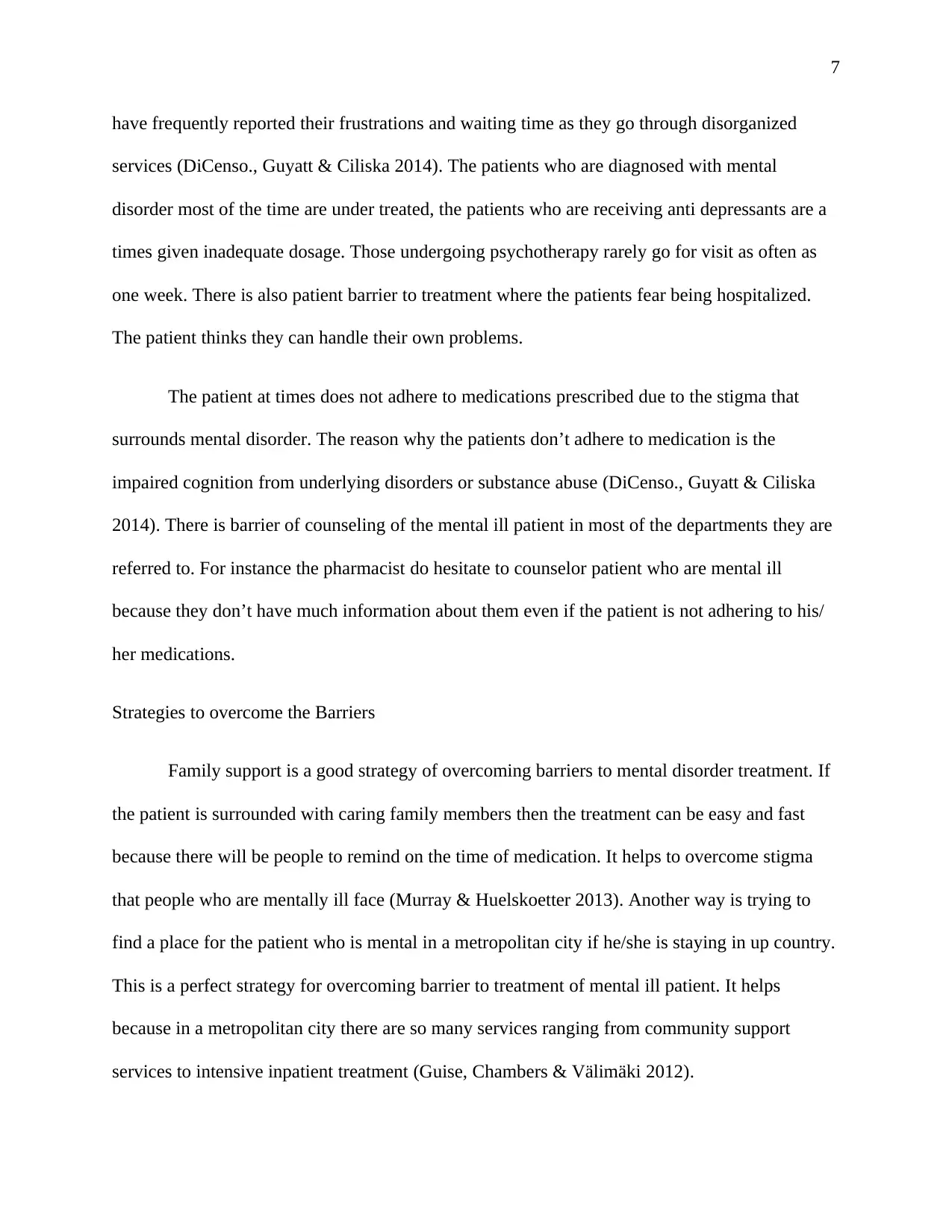
7
have frequently reported their frustrations and waiting time as they go through disorganized
services (DiCenso., Guyatt & Ciliska 2014). The patients who are diagnosed with mental
disorder most of the time are under treated, the patients who are receiving anti depressants are a
times given inadequate dosage. Those undergoing psychotherapy rarely go for visit as often as
one week. There is also patient barrier to treatment where the patients fear being hospitalized.
The patient thinks they can handle their own problems.
The patient at times does not adhere to medications prescribed due to the stigma that
surrounds mental disorder. The reason why the patients don’t adhere to medication is the
impaired cognition from underlying disorders or substance abuse (DiCenso., Guyatt & Ciliska
2014). There is barrier of counseling of the mental ill patient in most of the departments they are
referred to. For instance the pharmacist do hesitate to counselor patient who are mental ill
because they don’t have much information about them even if the patient is not adhering to his/
her medications.
Strategies to overcome the Barriers
Family support is a good strategy of overcoming barriers to mental disorder treatment. If
the patient is surrounded with caring family members then the treatment can be easy and fast
because there will be people to remind on the time of medication. It helps to overcome stigma
that people who are mentally ill face (Murray & Huelskoetter 2013). Another way is trying to
find a place for the patient who is mental in a metropolitan city if he/she is staying in up country.
This is a perfect strategy for overcoming barrier to treatment of mental ill patient. It helps
because in a metropolitan city there are so many services ranging from community support
services to intensive inpatient treatment (Guise, Chambers & Välimäki 2012).
have frequently reported their frustrations and waiting time as they go through disorganized
services (DiCenso., Guyatt & Ciliska 2014). The patients who are diagnosed with mental
disorder most of the time are under treated, the patients who are receiving anti depressants are a
times given inadequate dosage. Those undergoing psychotherapy rarely go for visit as often as
one week. There is also patient barrier to treatment where the patients fear being hospitalized.
The patient thinks they can handle their own problems.
The patient at times does not adhere to medications prescribed due to the stigma that
surrounds mental disorder. The reason why the patients don’t adhere to medication is the
impaired cognition from underlying disorders or substance abuse (DiCenso., Guyatt & Ciliska
2014). There is barrier of counseling of the mental ill patient in most of the departments they are
referred to. For instance the pharmacist do hesitate to counselor patient who are mental ill
because they don’t have much information about them even if the patient is not adhering to his/
her medications.
Strategies to overcome the Barriers
Family support is a good strategy of overcoming barriers to mental disorder treatment. If
the patient is surrounded with caring family members then the treatment can be easy and fast
because there will be people to remind on the time of medication. It helps to overcome stigma
that people who are mentally ill face (Murray & Huelskoetter 2013). Another way is trying to
find a place for the patient who is mental in a metropolitan city if he/she is staying in up country.
This is a perfect strategy for overcoming barrier to treatment of mental ill patient. It helps
because in a metropolitan city there are so many services ranging from community support
services to intensive inpatient treatment (Guise, Chambers & Välimäki 2012).
Paraphrase This Document
Need a fresh take? Get an instant paraphrase of this document with our AI Paraphraser
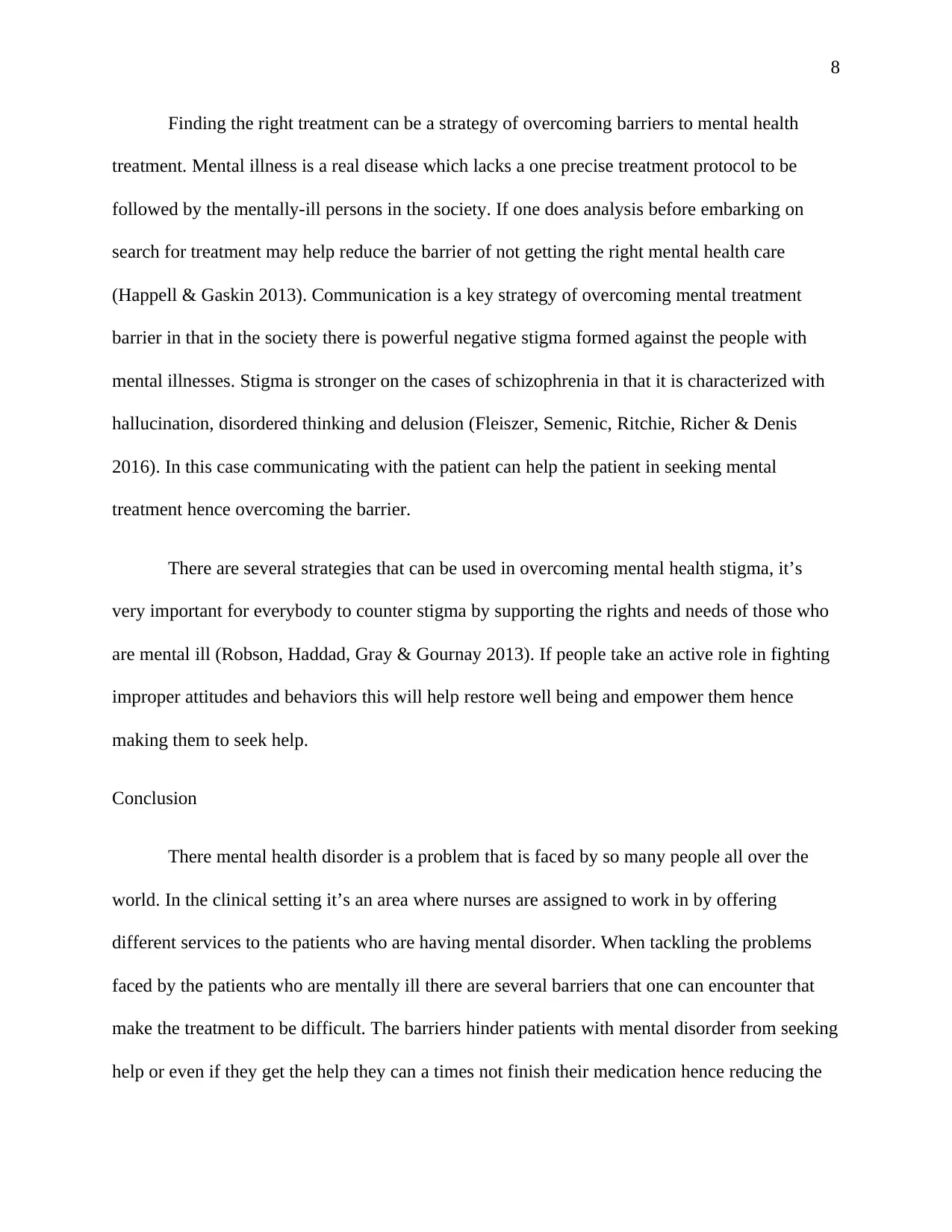
8
Finding the right treatment can be a strategy of overcoming barriers to mental health
treatment. Mental illness is a real disease which lacks a one precise treatment protocol to be
followed by the mentally-ill persons in the society. If one does analysis before embarking on
search for treatment may help reduce the barrier of not getting the right mental health care
(Happell & Gaskin 2013). Communication is a key strategy of overcoming mental treatment
barrier in that in the society there is powerful negative stigma formed against the people with
mental illnesses. Stigma is stronger on the cases of schizophrenia in that it is characterized with
hallucination, disordered thinking and delusion (Fleiszer, Semenic, Ritchie, Richer & Denis
2016). In this case communicating with the patient can help the patient in seeking mental
treatment hence overcoming the barrier.
There are several strategies that can be used in overcoming mental health stigma, it’s
very important for everybody to counter stigma by supporting the rights and needs of those who
are mental ill (Robson, Haddad, Gray & Gournay 2013). If people take an active role in fighting
improper attitudes and behaviors this will help restore well being and empower them hence
making them to seek help.
Conclusion
There mental health disorder is a problem that is faced by so many people all over the
world. In the clinical setting it’s an area where nurses are assigned to work in by offering
different services to the patients who are having mental disorder. When tackling the problems
faced by the patients who are mentally ill there are several barriers that one can encounter that
make the treatment to be difficult. The barriers hinder patients with mental disorder from seeking
help or even if they get the help they can a times not finish their medication hence reducing the
Finding the right treatment can be a strategy of overcoming barriers to mental health
treatment. Mental illness is a real disease which lacks a one precise treatment protocol to be
followed by the mentally-ill persons in the society. If one does analysis before embarking on
search for treatment may help reduce the barrier of not getting the right mental health care
(Happell & Gaskin 2013). Communication is a key strategy of overcoming mental treatment
barrier in that in the society there is powerful negative stigma formed against the people with
mental illnesses. Stigma is stronger on the cases of schizophrenia in that it is characterized with
hallucination, disordered thinking and delusion (Fleiszer, Semenic, Ritchie, Richer & Denis
2016). In this case communicating with the patient can help the patient in seeking mental
treatment hence overcoming the barrier.
There are several strategies that can be used in overcoming mental health stigma, it’s
very important for everybody to counter stigma by supporting the rights and needs of those who
are mental ill (Robson, Haddad, Gray & Gournay 2013). If people take an active role in fighting
improper attitudes and behaviors this will help restore well being and empower them hence
making them to seek help.
Conclusion
There mental health disorder is a problem that is faced by so many people all over the
world. In the clinical setting it’s an area where nurses are assigned to work in by offering
different services to the patients who are having mental disorder. When tackling the problems
faced by the patients who are mentally ill there are several barriers that one can encounter that
make the treatment to be difficult. The barriers hinder patients with mental disorder from seeking
help or even if they get the help they can a times not finish their medication hence reducing the

9
pace of their recovery. There are also several strategies that have been implemented to curb the
barriers that hinder treatments of the mental ill patients.
pace of their recovery. There are also several strategies that have been implemented to curb the
barriers that hinder treatments of the mental ill patients.
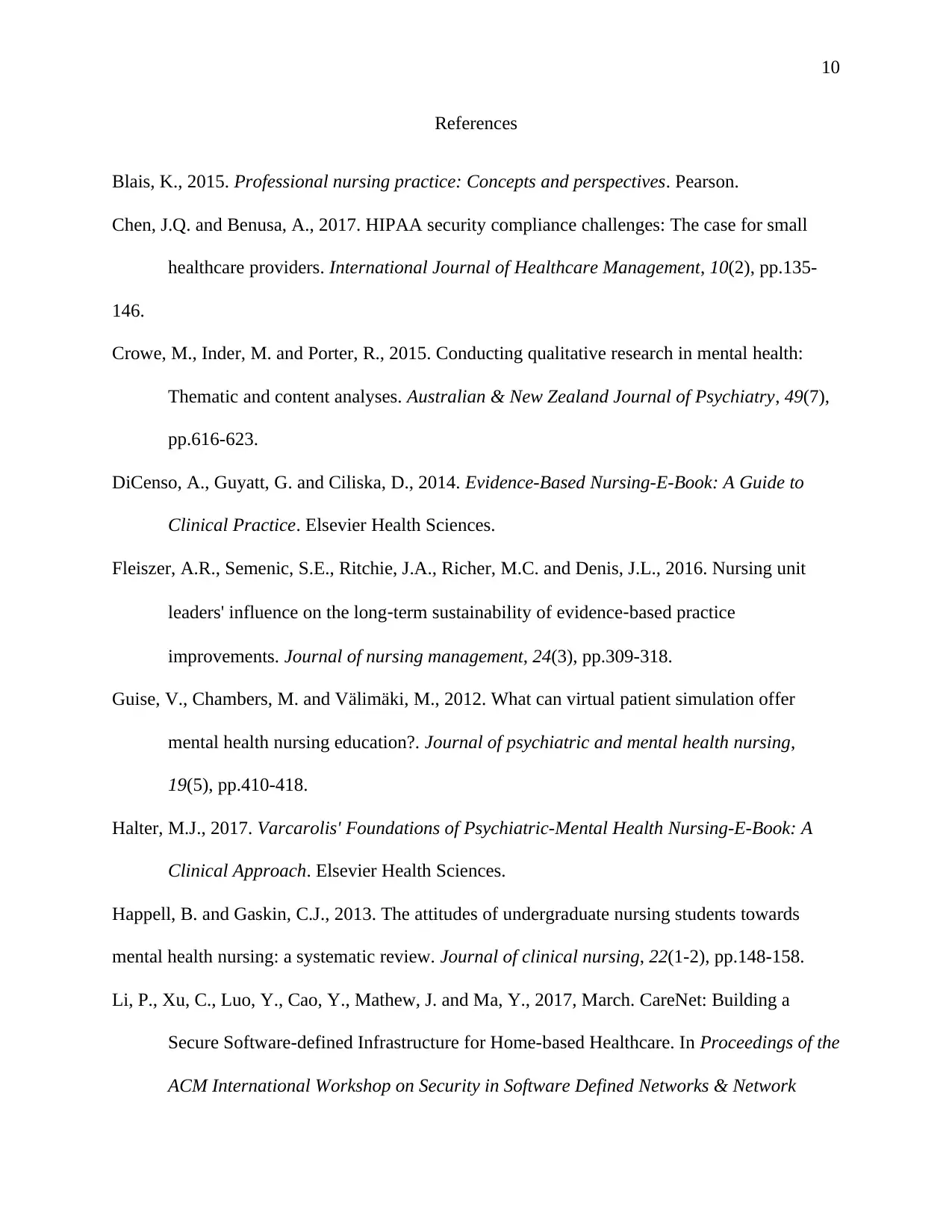
10
References
Blais, K., 2015. Professional nursing practice: Concepts and perspectives. Pearson.
Chen, J.Q. and Benusa, A., 2017. HIPAA security compliance challenges: The case for small
healthcare providers. International Journal of Healthcare Management, 10(2), pp.135-
146.
Crowe, M., Inder, M. and Porter, R., 2015. Conducting qualitative research in mental health:
Thematic and content analyses. Australian & New Zealand Journal of Psychiatry, 49(7),
pp.616-623.
DiCenso, A., Guyatt, G. and Ciliska, D., 2014. Evidence-Based Nursing-E-Book: A Guide to
Clinical Practice. Elsevier Health Sciences.
Fleiszer, A.R., Semenic, S.E., Ritchie, J.A., Richer, M.C. and Denis, J.L., 2016. Nursing unit
leaders' influence on the long‐term sustainability of evidence‐based practice
improvements. Journal of nursing management, 24(3), pp.309-318.
Guise, V., Chambers, M. and Välimäki, M., 2012. What can virtual patient simulation offer
mental health nursing education?. Journal of psychiatric and mental health nursing,
19(5), pp.410-418.
Halter, M.J., 2017. Varcarolis' Foundations of Psychiatric-Mental Health Nursing-E-Book: A
Clinical Approach. Elsevier Health Sciences.
Happell, B. and Gaskin, C.J., 2013. The attitudes of undergraduate nursing students towards
mental health nursing: a systematic review. Journal of clinical nursing, 22(1-2), pp.148-158.
Li, P., Xu, C., Luo, Y., Cao, Y., Mathew, J. and Ma, Y., 2017, March. CareNet: Building a
Secure Software-defined Infrastructure for Home-based Healthcare. In Proceedings of the
ACM International Workshop on Security in Software Defined Networks & Network
References
Blais, K., 2015. Professional nursing practice: Concepts and perspectives. Pearson.
Chen, J.Q. and Benusa, A., 2017. HIPAA security compliance challenges: The case for small
healthcare providers. International Journal of Healthcare Management, 10(2), pp.135-
146.
Crowe, M., Inder, M. and Porter, R., 2015. Conducting qualitative research in mental health:
Thematic and content analyses. Australian & New Zealand Journal of Psychiatry, 49(7),
pp.616-623.
DiCenso, A., Guyatt, G. and Ciliska, D., 2014. Evidence-Based Nursing-E-Book: A Guide to
Clinical Practice. Elsevier Health Sciences.
Fleiszer, A.R., Semenic, S.E., Ritchie, J.A., Richer, M.C. and Denis, J.L., 2016. Nursing unit
leaders' influence on the long‐term sustainability of evidence‐based practice
improvements. Journal of nursing management, 24(3), pp.309-318.
Guise, V., Chambers, M. and Välimäki, M., 2012. What can virtual patient simulation offer
mental health nursing education?. Journal of psychiatric and mental health nursing,
19(5), pp.410-418.
Halter, M.J., 2017. Varcarolis' Foundations of Psychiatric-Mental Health Nursing-E-Book: A
Clinical Approach. Elsevier Health Sciences.
Happell, B. and Gaskin, C.J., 2013. The attitudes of undergraduate nursing students towards
mental health nursing: a systematic review. Journal of clinical nursing, 22(1-2), pp.148-158.
Li, P., Xu, C., Luo, Y., Cao, Y., Mathew, J. and Ma, Y., 2017, March. CareNet: Building a
Secure Software-defined Infrastructure for Home-based Healthcare. In Proceedings of the
ACM International Workshop on Security in Software Defined Networks & Network
Secure Best Marks with AI Grader
Need help grading? Try our AI Grader for instant feedback on your assignments.
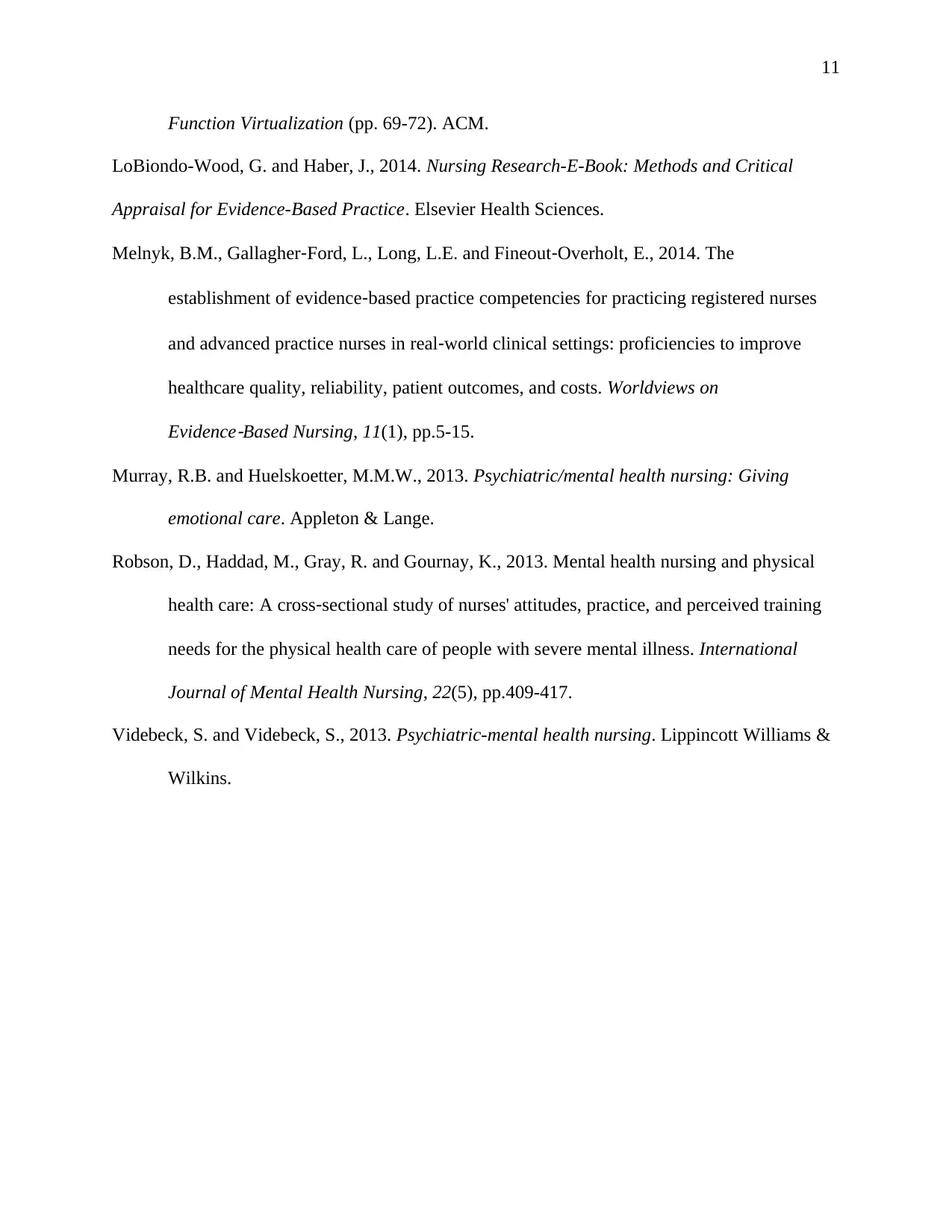
11
Function Virtualization (pp. 69-72). ACM.
LoBiondo-Wood, G. and Haber, J., 2014. Nursing Research-E-Book: Methods and Critical
Appraisal for Evidence-Based Practice. Elsevier Health Sciences.
Melnyk, B.M., Gallagher‐Ford, L., Long, L.E. and Fineout‐Overholt, E., 2014. The
establishment of evidence‐based practice competencies for practicing registered nurses
and advanced practice nurses in real‐world clinical settings: proficiencies to improve
healthcare quality, reliability, patient outcomes, and costs. Worldviews on
Evidence
‐Based Nursing, 11(1), pp.5-15.
Murray, R.B. and Huelskoetter, M.M.W., 2013. Psychiatric/mental health nursing: Giving
emotional care. Appleton & Lange.
Robson, D., Haddad, M., Gray, R. and Gournay, K., 2013. Mental health nursing and physical
health care: A cross‐sectional study of nurses' attitudes, practice, and perceived training
needs for the physical health care of people with severe mental illness. International
Journal of Mental Health Nursing, 22(5), pp.409-417.
Videbeck, S. and Videbeck, S., 2013. Psychiatric-mental health nursing. Lippincott Williams &
Wilkins.
Function Virtualization (pp. 69-72). ACM.
LoBiondo-Wood, G. and Haber, J., 2014. Nursing Research-E-Book: Methods and Critical
Appraisal for Evidence-Based Practice. Elsevier Health Sciences.
Melnyk, B.M., Gallagher‐Ford, L., Long, L.E. and Fineout‐Overholt, E., 2014. The
establishment of evidence‐based practice competencies for practicing registered nurses
and advanced practice nurses in real‐world clinical settings: proficiencies to improve
healthcare quality, reliability, patient outcomes, and costs. Worldviews on
Evidence
‐Based Nursing, 11(1), pp.5-15.
Murray, R.B. and Huelskoetter, M.M.W., 2013. Psychiatric/mental health nursing: Giving
emotional care. Appleton & Lange.
Robson, D., Haddad, M., Gray, R. and Gournay, K., 2013. Mental health nursing and physical
health care: A cross‐sectional study of nurses' attitudes, practice, and perceived training
needs for the physical health care of people with severe mental illness. International
Journal of Mental Health Nursing, 22(5), pp.409-417.
Videbeck, S. and Videbeck, S., 2013. Psychiatric-mental health nursing. Lippincott Williams &
Wilkins.
1 out of 11
Related Documents
Your All-in-One AI-Powered Toolkit for Academic Success.
+13062052269
info@desklib.com
Available 24*7 on WhatsApp / Email
![[object Object]](/_next/static/media/star-bottom.7253800d.svg)
Unlock your academic potential
© 2024 | Zucol Services PVT LTD | All rights reserved.





